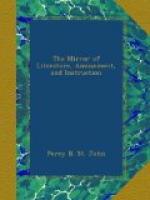* * * * *
TURKISH MUSICAL GUSTO.
A modern traveller informs us, that the band of an English ambassador at Constantinople once performed a concert for the entertainment of the Sultan and his court. At the conclusion it was asked, which of the pieces he preferred. He replied, the first, which was accordingly recommenced, but stopped, as not being the right one. Others were tried with as little success, until at length the band, almost in despair of discovering the favourite air, began tuning their instruments, when his highness instantly exclaimed, “Inshallah, heaven be praised, that is it!” The Turkish prince may be excused, when it is known that at the commemoration of Handel in 1784, Dr. Burney thought the mere tuning of that host of instruments more gratifying than the ordinary performances to which he had been accustomed.—Ibid.
* * * * *
RODE, THE VIOLINIST.
In 1814, he was resident at Berlin, where he gave a concert for the benefit of the poor, and on quitting that capital, returned to his native city, not again to quit it, except for one ill-starred visit to Paris in 1818. This visit threw a fatal colouring over all the rest of Rode’s days, and probably contributed to shorten his life. For several years he had played only in a small circle of admiring friends, who persuaded him (nothing loth to believe) that his talents were still unabated. The habit of hearing no one but himself had extinguished emulation, and deprived him of all means of comparison. Rode suddenly determined to re-appear in the musical world, and on his arrival in Paris sought for opportunities of playing in private parties, with as much eagerness as though he had still been a young man with a reputation to make. His old admirers were at first delighted to greet him; but they soon saw with unfeigned regret that he was compromising a great and well-earned name. His tone, once so pure and beautiful, had become uncertain; his bow was as timid as his fingers, and he no longer dared to indulge fearlessly the suggestions of his imagination; in short it was too apparent that, in spite of his delusion, Rode’s former confidence in himself was gone; and we know the importance of that feeling of self-reliance which men of talent derive from the innate consciousness of their own superiority: once destroyed, everything else vanishes with it. He was applauded; respect for the last efforts of what had once been first-rate talent secured him that meed; but he was applauded because his audience considered it a kind of duty, and without any symptoms of enthusiasm. He felt the distinction; a dreadful light broke in upon him, and for the first time he became conscious that he was no longer himself. The blow was the more severe as it was unlooked for: he left Paris overwhelmed with grief; the check he had received preyed incessantly on his mind and injured his health. A paralytic stroke toward the end of 1829 deprived him of the use of one side and affected his intellect, in which state he languished for nearly twelve months, till on the 25th of November, 1830, death relieved him from his sufferings.—From a Memoir of Rode in the Harmonicon.




